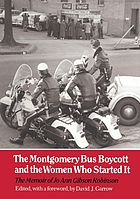Per Mrs. Robinson (all titles are listed, which jarred me at first until I realized why that would have been a big deal), Rosa Parks was actually just tired that day. I mean, she was part of it and all, but the boycott wasn't planned until after her arrest. The "Women Who Started It" were the three hundred members of Montgomery's three Women's Political Council chapters. Unfortunately the book is really more about the Montgomery Improvement Association (MIA) and Dr. King, than the women in the title.
I'm very sad to report that I didn't really like reading this memoir. The events of course are of great interest, but Mrs. Robinson's writing doesn't do it for me, and the focus wasn't what I'd expected, given the title. One thing that was interesting though is that the only paid employees of the MIA were four women--secretaries, office and project managers, more or less. It's also not very memoirish in that the there isn't all that much about the author's personal life in there. e.g. She's referred to as Mrs., so I guess she was married at some point, but there's no mention of a husband or any other nuclear family members. Emotions are indicated here and there, but don't carry a throughline. Best to think of it as a history told by a self-effacing English teacher.
From the not much has changed department
"The attempt to break down the machinery of segregation and white supremacy was frustrating. It actually required tearing out the roots of the white man's ideologies, his very life, leaving him insecure, afraid, panicky, desperate. This fear was the force that made him so bitterly opposed to integration of buses and, in fact, integration of anything." p.108
"Things really got hot in late January, as the police began to enforce their commissioner's "get-tough" policy. Hundreds of black motorists were stopped, searched, questioned, and given tickets for traffic violations. People who had never been accosted by policemen before were declared guilty of speeding or failing to recognize red lights, caution lights, or stop signs. Some were even accused of failing to ease up on a yield sign, staying too long at a stop sign, or not staying long enough. I myself received seventeen traffic tickets for all kinds of trumped up charges." p. 123
I'm on the fence about whether or not to recommend this book. It's good history, but just not told in the most compelling manner. It was "edited, with a foreword, by David J. Garrow." I wonder how much he influenced the story, for better or for worse.
